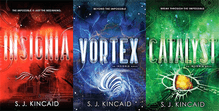Insignia trilogy
The Insignia trilogy is a series of three young-adult science fiction novels by S.J. Kincaid.
 Book Covers of the Insignia Trilogy | |
Insignia Vortex Catalyst Allies (prequel/novella) | |
| Author | S.J. Kincaid |
|---|---|
| Country | United States |
| Language | English |
| Genre | Young adult, Sci-Fi, Fantasy |
| Publisher | Katherine Tegen Books (an Imprint of Harper Collins) |
| Published | 2012 - 2014 |
| Media type | |
| No. of books | 3 + 1 Novella |
| Website | http://sjkincaid.com/ |
The novels describe a dystopian future where the Earth is in the middle of World War III, when teenage gamer Tom Raines is recruited to train with other young cadets as a pivotal member of the elite combat corps, the Intrasolar Forces. At the Pentagonal Spire's training academy, he makes the best friends of his life, fellow government pilots-in-training Wyatt Enslow, Vik Ashwan, and Yuri Sysevich.
Allies (novella)
Allies is a prequel to the Insignia Trilogy. It takes place before Insignia.
Reception
Insignia made the short-list for the 2014 Waterstones Children's Book Prize[1] and won the 2015 Young Adult Alabama Author Award from the Alabama Library Association.[2]
The book was nominated for multiple awards, including the 2014-2015 Soaring Eagle Book Award by the Wyoming Library Association,[3] the 2015 Sequoyah Book Award by the Oklahoma Library Association,[4] the Truman Reader Award by the Missouri Association of School Librarians,[5] the Connecticut Nutmeg Book Award by the Connecticut Association of School Librarians,[6] the 2015 Rhode Island Teen Book Award by the Rhode Island Library Association.[7]
The book was a Junior Library Guild selection,[8] a selection for the 2013 YALSA Best Fiction for Young Adults List,[9] a selection for the Summer 2012 Indie Next List,[10] and a selection for the Texas Lone Star Reading List[11] The book was also a 2016-2017 Sunshine State young readers award winner
References
- "Shortlists revealed for Waterstones Children's Book Prize". thebookseller.com.
- "Author Awards Luncheon and Award Winners". allanet.org.
- Darcy Lipp-Acord. "Teen Lit Talk". teenlitmom.blogspot.com.
- "2015 Intermediate Sequoyah Masterlist - Oklahoma Library Association". oklibs.org.
- "2014-2015 MASL Readers Awards Final Nominees - Missouri Association of School Librarians". maslonline.org.
- "Nutmeg Book Award". nutmegaward.org. Archived from the original on 2016-03-04. Retrieved 2016-03-13.
- "2015 Nominees - 2016 Rhode Island Teen Book Award - Prescott Library at The Wheeler School". libguides.com.
- "Junior Library Guild". juniorlibraryguild.com. Archived from the original on 2016-08-28. Retrieved 2016-03-13.
- "2013 Best Fiction for Young Adults". ala.org.
- "Insignia". indiebound.org. Archived from the original on 2017-04-13. Retrieved 2016-03-13.
- "2013 Texas Lone Star Reading List". texas.gov.